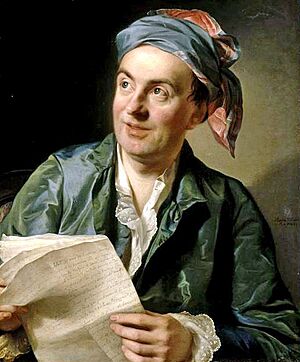Jean-François Marmontel facts for kids
Jean-François Marmontel (born July 11, 1723 – died December 31, 1799) was a famous French writer and historian. He was part of a group of thinkers called the Encyclopédistes, who worked together to create the first modern encyclopedia. Marmontel wrote many different kinds of works, including plays, stories, and essays.
Contents
Early Life and Career
Jean-François Marmontel was born into a poor family in a town called Bort, in Limousin (which is now part of Corrèze). He studied with the Jesuits, a religious order, and later taught at their schools in Clermont-Ferrand and Toulouse. In 1745, a famous writer named Voltaire advised him to move to Paris to become a writer.
From 1748 to 1753, Marmontel wrote several tragedies, which are serious plays with sad endings. Some of his plays included Denys le Tyran (1748) and Cleopâtre (1750). Even though these plays were only somewhat successful, they helped him meet important people in Paris's literary and fashionable circles.
Important Literary Works
Marmontel wrote many articles for the famous Encyclopédie. These articles showed his strong ability to think critically and understand literature. Later, these articles were collected into a book called Eléments de Littérature, which is still considered a classic in French literature today.
He also wrote several comic operas, which are plays with music and singing that usually have a happy ending. Two of his most popular comic operas were Sylvain (1770) and Zémire et Azore (1771). He also worked with the composer Niccola Piccinni on operas like Didon (1783).
In 1758, Marmontel gained the support of Madame de Pompadour, who was a powerful woman in the court of King Louis XV. She helped him get a job as a civil servant and manage an important official newspaper called Le Mercure. In this newspaper, he started publishing his famous series of short stories called Contes moraux (Moral Tales). These stories were known for their beautiful writing and their charming descriptions of French society during King Louis XV's time.
Later Life and Achievements
Marmontel became a member of the Académie française in 1763. This is a very important group in France that protects the French language and literature.
In 1767, he published a novel called Bélisaire. One chapter in this book talked about religious toleration, which means respecting different religions. This idea caused some controversy and was criticized by the Sorbonne and the archbishop of Paris. Marmontel responded to this criticism in his next novel, Les Incas, ou la destruction de l'empire du Perou (1777). In this book, he showed how the cruel actions of Spanish invaders in America were linked to their extreme religious beliefs.
He was given important roles, such as the official historian of France in 1771, secretary of the Academy in 1783, and a history professor in 1786. As a historian, Marmontel wrote a history of the regency period in 1788.
During the French Revolution, a difficult time known as the Reign of Terror, Marmontel lost his wealth and had to move away from Paris. He lived in a small cottage in the countryside. There, he wrote his important book, Memoires d'un père (Memoirs of a Father), which was published in 1804 after his death. This book was written to teach his children about his life. It describes his own childhood and gives a detailed look at literary life during two important periods in French history. It also includes many interesting descriptions of people he met, from old religious leaders to famous politicians.
Marmontel lived for some time with Madame Geoffrin, who hosted famous dinners for artists and thinkers. He was also a regular at gatherings where the Encyclopedists met. This gave him many opportunities to meet interesting people and gather material for his writings. He briefly returned to Paris in 1797 when he was elected to the Conseil des Anciens, a government body, but he died soon after in Abloville.
Marmontel was also a member of a Masonic lodge called Les Neuf Sœurs. His writings influenced other famous thinkers, including John Ruskin and John Stuart Mill.
Major Works
Theatre
Marmontel wrote many plays and opera librettos (the words for operas). He was especially good at writing librettos for comic operas.
- Denys le tyran (1748), a tragedy
- Aristomène (1749), a tragedy
- Cléopâtre (1750), a tragedy
- La Guirlande (1751), a ballet with music by Jean-Philippe Rameau
- Acante et Céphise (1751), an opera with music by Jean-Philippe Rameau
- Le Huron (1768), a comic opera with music by André Grétry
- Lucile (1769), a comic opera with music by André Grétry
- Sylvain (1770), a comic opera with music by André Grétry
- Zémire et Azor (1771), a comic opera with music by André Grétry
- Didon (1783), an opera with music by Niccolò Piccinni
Novels
- Contes moraux (Moral Tales) (1755–1759), a collection of short stories.
- Bélisaire (1767), a novel that discussed religious tolerance.
- Les Incas, ou la destruction de l'empire du Perou (1777), a novel about the Spanish conquest of Peru.
- Nouveaux contes moraux (New Moral Tales) (1792).
Essays
- Poétique française (French Poetics) (1763), a work about French poetry and drama.
- Éléments de littérature (Elements of Literature) (1787), a collection of his articles from the Encyclopédie.
- Mémoire sur la régence du duc d’Orléans (Memoir on the Regency of the Duke of Orléans) (1788).
- Mémoires d’un père pour servir à l’instruction de ses enfants (Memoirs of a Father for the Instruction of His Children) (1800), his autobiography.
See also
 In Spanish: Jean-François Marmontel para niños
In Spanish: Jean-François Marmontel para niños
 | Roy Wilkins |
 | John Lewis |
 | Linda Carol Brown |


